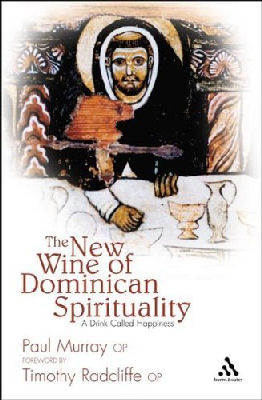
|
Posted May 15, 2006
Book: The New Wine of Dominican Spirituality: A Drink Called Happiness Author: Paul Murray, OP Burns and Oates, New York. 2006. Pp. 198 An Excerpt from the Jacket:
One of the things which has characterized the Dominican spirit from the beginning is a sense of openness to the world. Dominicans such as Thomas Aquinas, Jordan of Saxony and Catherine of Siena were not only impressive celebrants of grace. They were also defenders of nature. After the example of St. Dominic himself, they learned to drink deep from the wine of God's Word, and became witnesses not only of certain great moral and doctrinal truths but witnesses also of an unimaginable joy. One reason, in society today, why so many feel unfulfilled and are not happy is because the vision of life offered is one that is restricted to a pragmatic, one-dimensional view of the world. The Dominican vision of life we find presented in this book is one that is truly broad and joyous. It is a path of spirituality - a way - open to people of all kinds and conditions. An Excerpt from the Book: Study and Freedom "We theologians live by the promise of Christ: "the truth will set you free." That clear statement of vocation was made by the Dominican exegete and theologian Dominique Barthelemy, in an address he gave on the feast of St. Albert the Great in 1990. True liberty, Barthelemy went on to explain, cannot be handed down by a fixed, juridical framework: "it can only be gained by a demanding, patient and lucid search for the truth." No small part of the intellectual discipline to which Barthelemy is referring here is the task we call scholarship. At first sight, scholarship may seem to have little or nothing to do with spirituality or with the life of prayer. So why then should it be thought necessary? In a short but insightful paper entitled Scholarship, Sanctity and Spirituality, Simon Tugwell points out that 'scholarship helps to keep open or to re-open the potions that are actually there in the church.' he recalls the fact that Teresa of Avila always preferred learned directors to merely pious ones: 'Spiritual but unlearned directors were cramped by their own experience, they knew only one way to be Christian.' In contrast, 'Learned directors . . .were more free precisely because of their learning, more free to recognize as legitimate ways of being Christian which were not part of the prevailing ethos.' The reality is, of course, that people will often be swayed by the fashions of ther own age. And this holds true for spirituality as for everything else. What scholarship, at its ordinary best, can help us to see is that the authentic gospel tradition is not limited by the dominant fashions of thought and feeling of one particular generation. Table of Contents: 1. What is Dominican Spirituality? 2. Dominicans and happiness 3. "Eat the Book" Study in the Dominican tradition 4. Dominicans drinking: preachers and the new wine of the Gospel |
|
